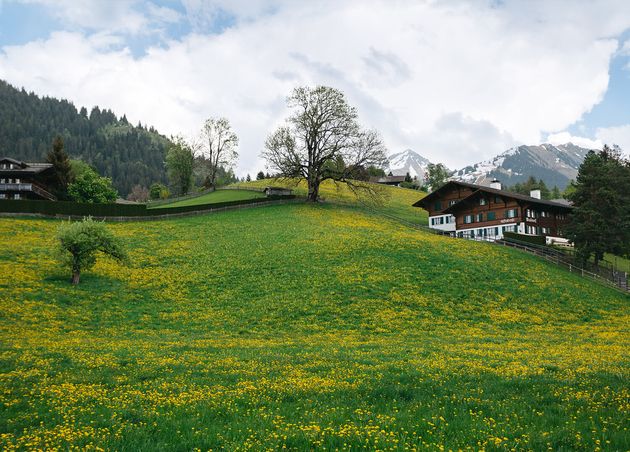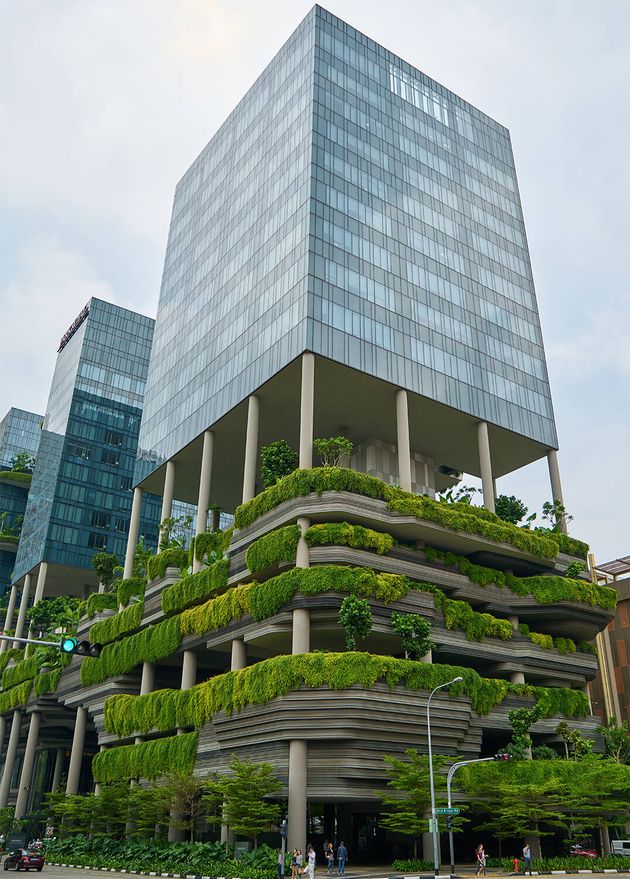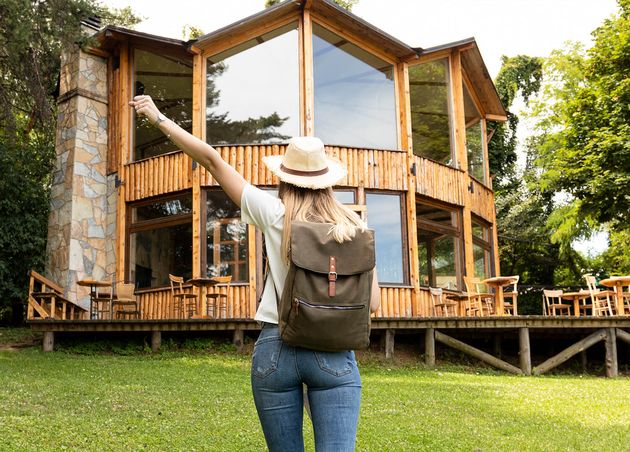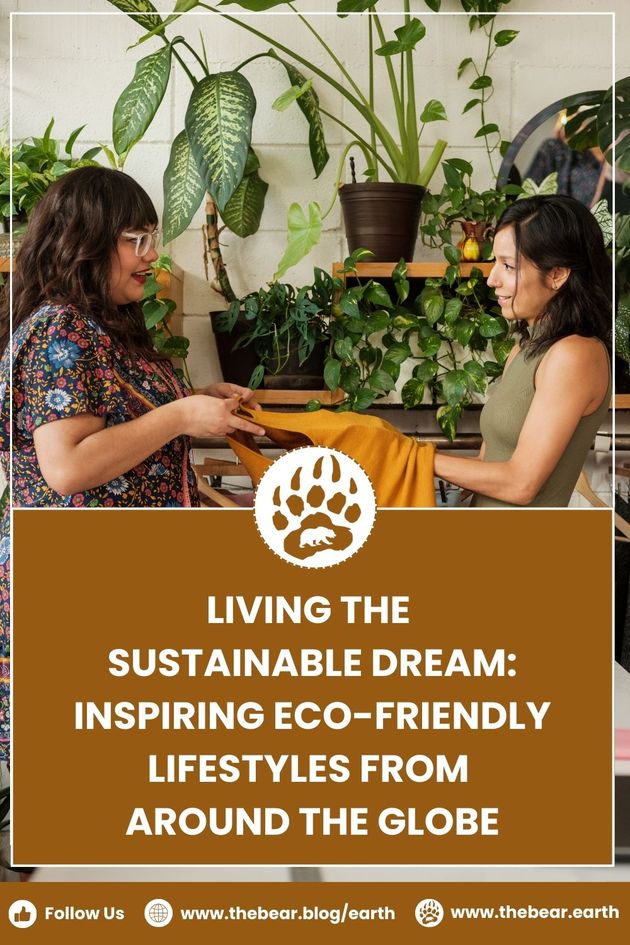Living the Sustainable Dream: Inspiring Eco-Friendly Lifestyles from Around the Globe
In an environmentally-conscious world, where the impact of human activities on the environment is a growing concern, sustainable living has gained significant momentum 🌱 Sustainable living means adopting eco-friendly practices and making conscious choices that reduce our carbon footprint, preserve natural resources, and ensure a healthier planet for future generations 🌎
So, this article explores inspiring eco-friendly lifestyles worldwide, showcasing how individuals and communities contribute to a sustainable dream. 🌎🌱
Understanding Sustainable Living
Sustainable living involves finding harmony between human needs and the planet's capacity to support them 🌎 It encourages responsible resource management and environmental conservation, allowing us to meet current needs while preserving future generations' capacity to fulfill their requirements.
For instance, adopting sustainable practices like reducing water usage, minimizing waste, and using energy-efficient technologies are critical components of sustainable living 🌱 By adopting these practices, individuals can significantly decrease their ecological footprint.
🌏 Eco Fact!
Individuals and communities must recognize their role in preserving the Earth's natural resources and protecting biodiversity.
Importance of Adopting Eco-Friendly Lifestyles
The urgency to embrace sustainable living has never been greater. Climate change, pollution, and habitat destruction threaten the delicate balance of our ecosystem 🌎 By adopting eco-friendly lifestyles, we can mitigate these threats and create a brighter, more sustainable future for all living beings. Small changes, like using reusable shopping bags or opting for eco-friendly household products, can significantly impact the planet 🌱
Sustainable Living Practices Worldwide
Embracing Renewable Energy Sources
One of the cornerstones of sustainable living is shifting from fossil fuels to sustainable energy resources 🌱 Countries like Denmark and Sweden have made remarkable progress using wind and solar power, setting a precedent for the world.
These countries have significantly invested in renewable energy infrastructure, making it accessible and affordable for their citizens 🌎 Additionally, governments have implemented policies and incentives to encourage the early adoption of renewable energy technologies.
Eco-Friendly Transportation Solutions
Communities worldwide are promoting sustainable transportation, such as biking and public transit, to reduce emissions from conventional vehicles 🌎 Initiatives like bicycle-sharing programs in Amsterdam and electric buses in China have significantly contributed to greener cities.
Moreover, cities are implementing infrastructure improvements to support sustainable transportation, such as making bike lanes and pedestrian-friendly spaces 🌱 This reduces pollution and promotes healthier lifestyles for residents.
Sustainable Food Choices and Agriculture
The global food system accounts for a substantial portion of greenhouse gas emissions 🌎 Embracing plant-based diets, supporting local farmers, and practicing regenerative agriculture can help reduce the environmental impact of our various food choices.
Countries like India have a rich tradition of vegetarian cuisine, which is nutritious and eco-friendly 🌱 Moreover, promoting local farmers' markets encourages consumers to buy locally-produced food, reducing the carbon footprint associated with transportation.
Minimizing Waste and Recycling
Countries like Japan and Switzerland have mastered the art of waste management by implementing innovative recycling programs and promoting a circular economy 🌎 These practices reduce waste sent to landfills and minimize environmental strain.
Japan, known for its meticulous waste separation, has achieved impressive recycling rates by involving its citizens in waste reduction efforts 🌱 Similarly, Switzerland's focus on waste-to-energy technologies has significantly decreased the amount of waste going to landfills.
Inspiring Eco-Friendly Initiatives Across the Globe
Green Cities and Eco-Villages from Costa Rica's eco-villages to Scandinavia's green cities, numerous communities are leading the way in sustainable urban planning and living 🌱 These models prioritize green spaces, renewable energy, and community engagement, creating healthier and happier living environments.
Eco-villages like Findhorn in Scotland have developed a holistic approach to sustainability, incorporating organic farming, renewable energy, and eco-friendly buildings 🌎 In green cities like Portland, Oregon, community involvement in urban planning has resulted in a network of parks and bike lanes. This makes it one of the most bike-friendly cities in the US.
Innovative Sustainable Architecture
Architects and builders worldwide incorporate eco-friendly materials and design concepts into their projects 🌎 Structures like Earthships in New Mexico and vertical gardens in Singapore showcase how sustainable architecture can be functional and aesthetically pleasing.
Earthships are self-sustaining homes built using recycled materials like tires and glass bottles, which help regulate indoor temperature naturally 🌱 Singapore, renowned for its vertical gardens, has integrated green spaces into its urban landscape, improving air quality and urban biodiversity.
Empowering Sustainable Communities
Local communities play a pivotal role in driving sustainable change 🌱 From community gardens in London to plastic-free initiatives in Bali, people are coming together to impact the environment and each other positively.
Community gardens provide fresh produce to residents and foster a sense of community and social cohesion 🌎 Similarly, Bali's "Bye Bye Plastic Bags" movement, initiated by young activists, has significantly reduced single-use plastic waste on the island.
Eco-Tourism and Its Impact on Local Communities
Eco-tourism promotes responsible travel that benefits travelers and local communities 🌎 It encourages visitors to appreciate and preserve their destinations' natural and cultural heritage.
Sustainable travel involves choosing tour operators and accommodations, prioritizing environmental conservation, and supporting local communities 🌱 This form of tourism ensures that tourism's economic benefits are reinvested in preserving natural resources and the welfare of indigenous communities.
Eco-Friendly Accommodations and Practices
Hotels and resorts embrace sustainable approaches, such as energy-efficient systems, reduced water consumption, and locally sourced amenities 🌎 Eco-friendly accommodations cater to environmentally conscious travelers.
Many eco-friendly hotels have implemented green initiatives, such as solar panels for electricity, rainwater harvesting, and using biodegradable toiletries 🌱 Some even offer educational programs to guests about their sustainability efforts, raising awareness and encouraging responsible travel.
Supporting Local Economies Through Eco-Tourism
Eco-tourism creates economic opportunities for local communities, fostering a sense of pride in their natural and cultural heritage 🌎 This sustainable tourism approach ensures that travel benefits are shared equitably.
Local communities often participate in eco-tourism activities as guides, artisans, or providers of traditional services 🌱 This involvement generates income and helps preserve local traditions and cultural practices.
Promoting Sustainable Fashion and Consumption
Ethical Fashion Brands and Their Mission Ethical fashion brands prioritize fair labor practices and sustainable materials, challenging the fast-fashion industry 🌱 Consumers increasingly embrace brands that align with their values.
Ethical fashion brands often ensure transparency in their supply chain, guaranteeing fair wages and safe working conditions for garment workers 🌎 Additionally, they utilize eco-friendly fabrics like organic cotton and recycled polyester, minimizing the environmental impact of fashion production.
🌏 Eco Trivia!
The fashion industry actually accounts for around 10% of global carbon emissions, and embracing sustainable fashion can make a significant difference!
Embracing Second-hand and Upcycled Fashion
Second-hand shopping and upcycling are gaining popularity as eco-friendly alternatives to conventional fashion consumption 🌎 Thrifting reduces textile waste, while upcycling gives new life to old garments.
Second-hand clothing stores and online platforms provide fashion enthusiasts with an affordable and sustainable option 🌱 Upcycling involves:
- Transforming old clothes into new and trendy designs.
- Reducing the demand for new apparel.
- Extending the lifespan of existing garments.
The Power of Conscious Consumerism
Individuals can influence sustainability by making informed choices as consumers 🌎 Supporting environmentally responsible brands and reducing unnecessary purchases contribute to a more sustainable future.
By opting for products with eco-labels or certifications, consumers can be confident that their purchases meet specific environmental and ethical standards 🌱 Additionally, boycotting companies with poor sustainability practices can send a powerful message for positive change.
Sustainable Living in Education and Business
Incorporating Sustainability into Educational Curricula is essential 🌱 Educational institutions integrate sustainability into their curriculums to empower the next generation of change-makers.
Knowledge and awareness play an essential role in creating a sustainable world. From elementary schools to universities, sustainability-focused courses are becoming increasingly popular 🌎 These courses cover environmental conservation, sustainable development, and green technologies, equipping students with more knowledge and skills to address global challenges.
Eco-Friendly Initiatives in Corporate Environments
Companies are adopting green practices, such as energy conservation, waste reduction, and sustainable sourcing 🌎 Corporate responsibility aligns with consumer expectations and creates a positive impact.
Progressive companies have set ambitious sustainability targets for carbon neutrality, zero waste, and improved social impact 🌱 They engage employees in sustainability initiatives, fostering a culture of responsibility and innovation.
Green Businesses and Social Responsibility
Green businesses prioritize profitability and environmental impact 🌱 By considering their ecological footprint, these companies contribute to a more sustainable and prosperous future.
Some businesses have adopted a "triple bottom line" approach, measuring success by financial performance and environmental and social achievements 🌎 Through corporate social responsibility (CSR) programs, these businesses invest in local communities, support ecological projects, and promote sustainable practices across their supply chains.
Overcoming Challenges and Roadblocks to Sustainability
Sustainable living faces skepticism and misinformation 🌎 Educating others about its benefits and dispelling misconceptions is essential for widespread adoption.
Public awareness campaigns, educational workshops, and expert-led discussions can inform people about the science and rationale behind sustainable living practices 🌱 Collaborating with influencers and celebrities passionate about sustainability can amplify the message to a broader audience.
Government Policies and Support for Sustainable Living
Governments worldwide play a significant role in creating an environment that fosters sustainable living 🌱 Supportive policies and incentives can accelerate positive change.
Governments can offer tax breaks or subsidies for renewable energy installations, encourage sustainable business practices through regulations, and invest in infrastructure projects 🌎 These policies signal the government's commitment to sustainability and provide a conducive environment for all individuals and businesses to adopt eco-friendly practices.
Promoting Sustainability on a Global Scale
Collaboration between countries and international organizations is vital to climate change and resource depletion 🌱 Shared responsibility can lead to a sustainable world.
International agreements, like the Paris Agreement, serve as frameworks for countries to collectively work towards mitigating climate change 🌎 Collaboration between nations allows for exchanging knowledge and best practices, fostering a global movement towards sustainability.
Living the sustainable dream is not an unattainable fantasy but an inspiring reality many individuals and communities already embrace 🌱 By adopting eco-friendly practices, supporting sustainable initiatives, and making deliberate decisions; we can shape a more environmentally friendly world for ourselves and future generations.
Together, we can all make a lasting positive impact on the planet we call home 🌎
Recommended for you
Izakaya Kachan Restaurant: A Satisfying Japanese Cuisine in Bangkok
Tle (Hungry Bear)
Travel to Kanchanaburi: A Nostalgic Day Trip to Death Railway
Shane, The Bear Traveler
Top 10 Must-Visit Stunning Attractions in Lopburi City
Rowan (Guinness Bear)
Holidays in Thailand: Exploring Ramadan Traditions and Festivities
Holly (Holiday Bear)






































